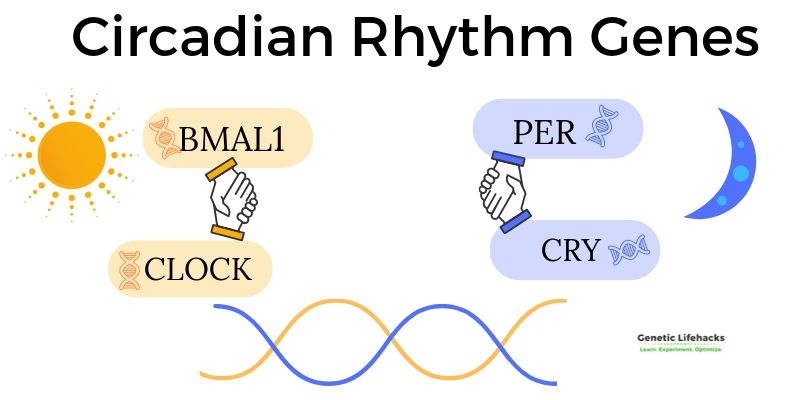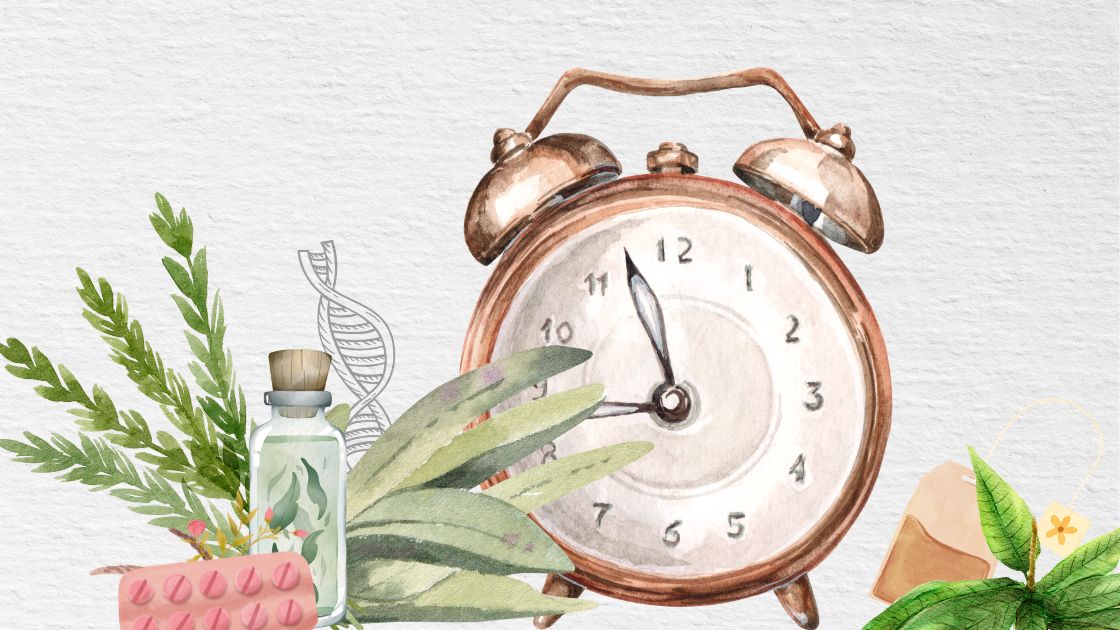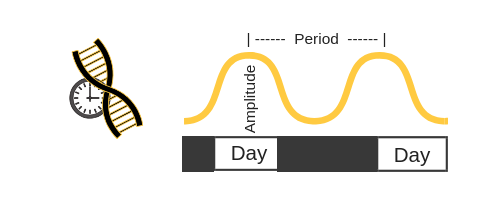Key takeaways:
~ Common, natural supplements can change circadian gene expression.
~ The timing of taking a supplement may alter its effect on you.
~ Possible benefits of controlling circadian rhythm: better mental health, better blood glucose control, prevention of dementia/Alzheimer’s, quality sleep, and overall well-being.
How some supplements alter circadian gene expression:
First, let me explain what I mean by gene expression.
Your genes are sections of your DNA that code for proteins. Not all genes are being translated into proteins all the time in cells. Instead, your cells have ways to turn on and off gene translation so that the right amount of protein is available at the right time.
Altering gene expression can mean the gene is being translated into the protein when it normally wouldn’t be — or vice-versa. Simply put, it is like turning on or off a gene.
Background on circadian rhythm:
Skip ahead if you know this already…
Your circadian rhythm is the approximately 24-hour cycle of various biological activities which go on every day. (circa – about; dien – a day).
What is controlled by your circadian rhythm?
- sleep/wake cycle
- eating times
- producing digestive enzymes
- body temperature cycles (falls at night)
- insulin sensitivity (higher in the morning)
- immune response (decreased at night)
- blood pressure (lower at night, higher during the day)
- hormone rhythmic release (cortisol rhythm, melatonin at night)
Researchers now know the body has thousands of internal activities that oscillate over the course of the 24-hour day.
All of this is driven by a molecular core circadian clock, which is located in a region of your hypothalamus called the suprachiasmatic nucleus.
In this brain region, the levels of a pair of core circadian clock proteins rise during the day and then are suppressed at night as another pair of clock proteins rise during the night.
- The CLOCK and BMAL1 proteins make up the ‘positive arm’ of the circadian clock
- The opposite arm of the clock contains the proteins called Period (PER1/2) and Cryptochrome (CRY1/2).[ref]
Researchers can sample the amount of these proteins created at a specific time and can plot when the CLOCK and BMAL1 proteins are high or low, and then when the CRY and PER proteins are high or low.
This oscillation over 24 hours makes up your core circadian clock.
Researchers talk about the amplitude of the clock genes — how much of the protein is created at the peak time. They also talk about the period of the clock genes – the time between when those peaks occur. Here’s a quick visual for the concept:
To recap: the main genetic players in the core circadian clock are CLOCK, BMAL1, CRY1/2, and PER1/2.
In addition, there is a secondary regulatory loop where the REVERBa and RORa genes are also important. These are both retinoic acid (vitamin A) related genes.

How is circadian rhythm set?
All living things – plants, animals, even microorganisms — have a built-in circadian rhythm. It is fundamental to life. This circadian rhythm generally lasts for around 24 hours, set by the sun rising and setting over the course of a day.
But how is this rhythm re-aligned or re-set? If the natural rhythm of a person or animal is off by 15 or 20 minutes a day, there has to be a way to reset it and keep everything functioning together in concert.
Light from the sun resets the core circadian rhythm in almost every living thing, from plants to fungi to animals.[ref]
For humans, sunlight hits receptors in the retina of the eye. This signal sets the circadian rhythm within the suprachiasmatic nucleus, and it stops the production of melatonin in the pineal gland.
Prior to electric lighting (millions of years), the only light sources were sunlight during the day and firelight (candles, lanterns, fireplace) or moonlight at night.
The receptors in our eyes are stimulated at ~479nm wavelengths of light, which is in the blue spectrum.
Fast forward millions of years to modern life with bright light found 24 hours a day from our electric lightbulbs. This has escalated recently with the blue light emitted from our TVs, laptops, cell phones, etc.
You can see where I’m going with this…
Blue light at night is screwing with our circadian rhythm (and the circadian rhythm of all the animals living near our homes and cities).
The solution is to block out artificial light at night. Blue-blocking glasses are made for this purpose, and some lightbulbs now produce a warm, orangish hue for low-level lighting at night. Simple actions – like shutting off outside lights at night, dimming your indoor lighting, or shifting away from electronics at night – can help your circadian rhythm stay on track. The flip side is that getting outside in the sunlight is important each morning to reset your circadian rhythm as well.
Beyond Light and Darkness: Altering Circadian Rhythm with Supplements
Personally, I’ve optimized my circadian rhythm as much as possible by blocking blue light at night, sleeping in the dark, and getting sunlight each morning. The benefits of those three things have made an outstanding difference for me when it comes to sleep, mood, energy, and overall health. (Read more: Blocking blue light; Circadian Genes and Mood)
But what if there is more? What if manipulating circadian gene expression could do even more than adjusting my life to the natural rhythm of the sun has done?
Peripheral Circadian Rhythms
I’ve given a simplified overview here of the circadian system as a core circadian clock set by sunlight and darkness.
It actually gets more complex… There are secondary systems called peripheral clocks, which synchronize and affect the core circadian clock.
Each tissue or organ in the body also has its own circadian rhythm and its own peripheral clock.
For example, your liver has an internal timing system, anticipating when you will probably eat and drink. The liver then produces enzymes needed to break down food and toxins when you normally eat. If, for example, you get up every morning at 6 am and drink your first cup of coffee at 6:30 am, your liver will produce the enzymes needed for metabolizing caffeine (CYP1A1 gene) in anticipation of your cup of coffee.
Your peripheral clock genes in your organs need to be aligned with your core circadian clock. Dysregulation of circadian systems, or getting your peripheral clocks out of sync, is thought to be one driver of many modern, chronic diseases.[ref]
So how can the supplements that you take at breakfast affect your circadian rhythm? And does switching to taking supplements at night make a difference?
Let’s dig into the research on what is known at this point in time.
Circadian gene expression changed by natural supplements:
Passionflower Extract increases circadian gene expression:
Passionflower is an herbal supplement (or tea) used for anxiety and anxiety-related sleep disorders. It is an age-old remedy to calm down and sleep well.
Animal studies show passionflower extract increases the amplitude of PER1/2 and CRY1 gene expression in the liver, but it doesn’t shift the phase of when the genes are expressed.
In the brain, passionflower extract increased the expression of BMAL1 and CLOCK. Interestingly, it also caused a change in cortisol levels – decreasing the levels when they should be low, but not affecting the peak levels.[ref]
NAD+ increases PER1:
Increasing NAD+ levels has been shown in animal studies to increase PER1 gene expression and also to reduce weight gain.[ref]
The supplements NR (nicotinamide riboside) and NMN (nicotinamide mononucleotide) have been shown in both animal and human studies to increase NAD+ levels. (Read more: NAD+ Reversing Aging? Overview of NR and NMN )
You can get Nicotinamide Riboside and NMN online or through your local health food store.
Berberine increases BMAL1
Berberine is a component of several different plants traditionally used as natural medicines. It is known for regulating blood glucose levels. A recent cell study looked at the effects of berberine on adipose tissue. The study showed that berberine upregulated FGF21 (important in glucose regulation) by increasing BMAL1.[ref]
Berberine is available online and through your local health food store. It may also lower blood pressure in addition to lowering blood glucose levels, so check with your doctor if you are on any prescription meds.
Related article: Berberine research studies and absorption
Resveratrol: restoring and normalizing CLOCK, BMAL1, and PER2 when fat is high
Fatty liver disease (NAFLD) decreases the expression of CLOCK and BMAL1. Resveratrol has been shown in cell studies to restore BMAL1 expression in liver cells treated with fatty acids.
Other studies show resveratrol also normalizes the rhythm of CLOCK and PER2 in addition to BMAL1 in animals fed an obesogenic diet.[ref][ref]
Additionally, resveratrol has been shown to reverse acrylamide’s negative effects on circadian rhythm.[ref] When food is browned through a Maillard reaction (e.g., french fries, toast), it can form acrylamide, which has been shown in several studies to downregulate circadian genes in both the liver and brain as well as cause cognitive deficits.[ref] Acrylamide is also found in cigarette smoke.
Takeaways: If you are eating a crappy diet of fried foods, resveratrol in the morning may help to restore your circadian rhythm. Another way of looking at it is that fried foods affect your health by messing up your circadian rhythm.
Nobiletin increases PER2
Nobiletin is a flavonoid found in citrus fruits. It has been fairly well studied in its effect on circadian rhythm. Specifically, it increases the amplitude and lengthens the period for PER2.[ref]
There is a Life Extension Foundation supplement called Circadian Sleep. It includes both 1.5mg of melatonin and 50 mg of nobiletin.
Lithium orotate impacts BMAL1 and PER2
Lithium carbonate has been used in high doses for decades as a prescription medication for bipolar disorder. Lithium orotate, though, is available in low doses as a supplement.
Research shows:
- Lithium affects BMAL1 expression by inhibiting GSK3.[ref]
- Lithium upregulates PER2 expression.[ref]
- It lengthens the period of peripheral clock gene expression (in mice).[ref]
DHA (fish oil) supplements affect BMAL1:
The omega-3 fatty acid DHA has been shown in cell studies on neurons to affect BMAL1. The study found that palmitate, an often inflammatory saturated fat, altered the period of BMAL1 expression. However, DHA could protect the cells from the negative effect.[ref]
This study hints that some of the negative effects of palmitic acid may be due to the disruption of BMAL1.
Jiao-Tai-Wan increases CRY1/2:
A traditional Chinese medicine herbal blend called Jiao-Tai-Wan has been shown to affect circadian rhythm. The herbal blend contains Thizome coptidis and Cortex cinnamomi (Chinese cinnamon).
It is traditionally used for insomnia but also helps decrease insulin resistance and increase weight loss. A recent study showed that Jiao-Tai-Wan upregulated the CRY1 and CRY2 proteins and downregulated inflammatory proteins.[ref]
Interestingly, genetic variants in the CRY2 gene are linked to an increased risk of obesity and higher fasting blood glucose levels.
Supplements that affect circadian rhythm without affecting gene expression:
Lion’s Mane alters active time
A recent animal study shows Lion’s mane mushroom extract (Hericium erinaceus) alters the sleep/wake activity timing without altering the core circadian clock genes. The study found that the animals given the lion’s mane extract were active earlier in their normal activity period and then also went to sleep earlier. This didn’t affect the expression of the PER genes or BMAL1 (which were the two circadian genes investigated in the study).[ref]
If you are working to shift your circadian rhythm towards being more active in the morning, perhaps Lion’s Mane would help. Lion’s mane is available as a powdered supplement that blends well with coffee, or you can get it in capsules.
Curcumin timing in cancer adjuvant testing:
Cancer studies show that curcumin induces cell death in cancer cells (in a petri dish – don’t take it instead of chemo).
Researchers investigated the anti-cancer effects of curcumin based on the dose timing. The study found that low-dose curcumin treatments given 6-11 hours before peak PER2 expression were most effective in killing cancer cells.[ref]
This was just a cell study – so the timing of curcumin treatment in humans still needs to be researched. I’ve included it here, not as a definitive time for taking curcumin, but rather as an example of how timing matters and may change depending on your desired outcome.
Lifehacks:
The rest of this article is for Genetic Lifehacks members only. Consider joining today to see the rest of this article.
Related Articles and Topics:
Glycine and Slow Wave Sleep:
Slow-wave sleep is an essential part of sleep quality. Learn how glycine affects slow-wave sleep.
BDNF and Serotonin:
BDNF helps your brain maintain good function, and serotonin is an essential neurotransmitter. Genetic variants in both genes together may increase the risk of certain mood disorders.
Why Circadian Rhythm Disruption Causes Depression
For some people, circadian disruption can be chronic – and at the heart of depression or mood disorders. Genetic variants play a role in this susceptibility. Fortunately, there are solutions that may help.
BMAL1: Core circadian gene with links to heart disease, cancer, and diabetes
A core circadian rhythm gene, BMAL1, influences heart disease risk, diabetes, and cancer. Check your genes and learn how to mitigate the risk.


